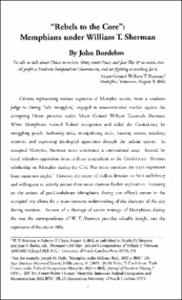Please use this identifier to cite or link to this item:
http://hdl.handle.net/10267/28392Full metadata record
| DC Field | Value | Language |
|---|---|---|
| dc.contributor.advisor | Huebner, Timothy S. | en_US |
| dc.contributor.author | Bordelon, John | en_US |
| dc.coverage.spatial | Lat/Long | en_US |
| dc.date.accessioned | 2016-10-31T21:43:16Z | - |
| dc.date.available | 2016-10-31T21:43:16Z | - |
| dc.date.issued | 2005 | en_US |
| dc.identifier.uri | http://hdl.handle.net/10267/28392 | - |
| dc.description | Scanned and uploaded by Will Clinton '19. | en_US |
| dc.description.abstract | Citizens representing various segments of Memphis society, from a southern judge to daring "lady smugglers," engaged in unconventional warfare against the occupying Union presence under Major General William Tecumseh Sherman. White Memphians resisted Federal occupation and aided the Confederacy by smuggling goods, harboring spies, manipulating trade, burning cotton, attacking steamers, and expressing ideological opposition through the judicial system. In occupied Memphis, Sherman never confronted a conventional army. Instead, he faced relentless opposition from civilians sympathetic to the Confederacy. Previous scholarship on Memphis during the Civil War treats examines the city's experience from numerous angles.2 However, the extent of civilian devotion to the Confederacy and willingness to actively pursue their cause deserves further exploration. Focusing on the actions of pro-Confederate Memphians during one officers tenure in the occupied city allows for a more intimate understanding of the character of the city during wartime. Because of a shortage of extant writings of Memphians during the war, the correspondence of W T. Sherman provides valuable insight into the experience of the city in 1862. | en_US |
| dc.language.iso | en_US | en_US |
| dc.publisher | Memphis, Tenn. : Rhodes College | en_US |
| dc.rights | All materials in this collection are copyrighted by Rhodes College and subject to Title 17 of the U.S. Code. This documentation is provided for online research and access purposes only. Permission to use, copy, modify, distribute and present this material, without fee, and without written agreement, is hereby granted for educational, non-commercial purposes only. The Rhodes College Archives reserves the right to decide what constitutes educational and commercial use. In all instances of use, acknowledgement must be given to Rhodes College Archives and Special Collections, Memphis, TN. For information regarding permission to publish this material, please email the Archives at archives@rhodes.edu. | - |
| dc.rights | All materials in this collection are copyrighted by Rhodes College and subject to Title 17 of the U.S. Code. This documentation is provided for online research and access purposes only. Permission to use, copy, modify, distribute and present this material, without fee, and without written agreement, is hereby granted for educational, non-commercial purposes only. The Rhodes College Archives reserves the right to decide what constitutes educational and commercial use. In all instances of use, acknowledgement must be given to Rhodes College Archives and Special Collections, Memphis, TN. For information regarding permission to publish this material, please email the Archives at archives@rhodes.edu. | en_US |
| dc.subject | Memphis Center | en_US |
| dc.subject | Student research | en_US |
| dc.subject | Institute for Regional Studies | en_US |
| dc.subject | Papers | en_US |
| dc.subject | Text | - |
| dc.title | "Rebels to the Core": Memphians under William T. Sherman | en_US |
| dc.title.alternative | Rhodes Institute for Regional Studies Student Papers | en_US |
| dc.type | Other | en_US |
| Appears in Collections: | Rhodes Institute for Regional Studies | |
Files in This Item:
| File | Description | Size | Format | |
|---|---|---|---|---|
| Bordelon_John_Rebels_ocr.pdf | 14.39 MB | Adobe PDF |  View/Open |
Items in DSpace are protected by copyright, with all rights reserved, unless otherwise indicated.